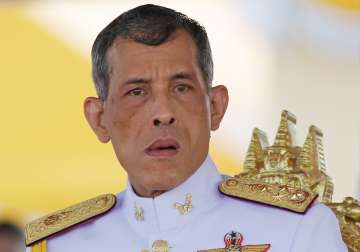Crown prince Maha Vajiralongkorn becomes new king of Thailand
Thailand's Crown Prince Maha Vajiralongkorn was formally proclaimed king in a televised ceremony here on Thursday, succeeding his much-revered late father, who reigned for 70 years. The new monarch, who received the title "His Majesty

Thailand's Crown Prince Maha Vajiralongkorn was formally proclaimed king in a televised ceremony here on Thursday, succeeding his much-revered late father, who reigned for 70 years.
The new monarch, who received the title "His Majesty King Maha Vajiralongkorn Bodindradebayavarangkun," assumed his new position yesterday, according to an announcement broadcast on all TV channels.
He will also be known as Rama X, the tenth king in the Chakri dynasty that was founded in 1782.
A videotaped broadcast showed senior officials presenting the formal invitation to the prince to become king, and then his acceptance. It then showed the officials prostrate themselves at the feet of the new king, who was wearing a formal white uniform with decorations.
"In accordance with the Palace Law and the constitution, I accept the invitation (to become king) for the sake of (the late King) His Majesty and for all the Thai people," Vajiralongkorn said.
Vajiralongkorn's father, Bhumibol Adulyadej, died on October 13 at age 88 after many years of ill health. In 1972, Bhumibol designated Vajiralongkorn — his second child and only son — as his successor.
Vajiralongkorn, 64, was originally expected to assume the throne the day his father died, but in a surprise announcement, Prime Minister Prayuth Chan-ocha said the prince asked for the succession to be put off so he would have time to mourn.
Prayuth said Thursday night that because of tradition that the throne should not remain vacant, the new king's reign will be considered as beginning on the day Bhumibol died.
"His majesty the new king, the beloved son of the late king, will carry forward his leadership and legacy," he said.
Thailand is a constitutional monarchy — although currently under military rule — but Bhumibol played an important role in stabilizing his country through a time of enormous change which saw neighboring monarchies collapse under the pressures of the Vietnam War. He was especially known for his energy in development activities, doing hands-on inspections in remote rural areas. He calmed the country through several political crises.
Vajiralongkorn faces the challenges of a country that has become fractured over the past decade, as contending political forces engaged in bitter battles that sometimes turned violent, leaving a residue of bad feeling and shaking faith in the democratic system.
The new king, with a less intense interest in state affairs and a reputation as a playboy, does not command the same level of respect as Bhumibol. He has gone through divorces with three women who have borne him seven children, and in recent years has spent much of his time residing in Germany. Although most Thais are devoted to the royal institution, it is hard to gauge how they feel privately about Vajiralongkorn because of harsh laws that mandate a prison term of three to 15 years for anyone found guilty of insulting the monarchy.
Information about the succession has been tightly controlled, and international news broadcasts about Thailand have been blocked in recent days.
The United States, whose diplomatic relations with Thailand date back more than 180 years, congratulated Vajiralongkorn on his ascension to the throne. State Department spokesman Mark Toner told reporters in Washington that Bhumibol had been a great friend of U.S. and it looked forward to deepening the relationship between the two countries going forward.
The prince made his first public appearance in more than a week earlier Thursday, attending a religious ceremony honoring his late father. He was accompanied by his three sisters, two adult daughters and 11-year-old son.
Shortly afterward, he granted an audience to National Legislative Assembly President Pornpetch Wichitcholchai, Prime Minister Prayuth, Supreme Court Chief Justice Veerapol Tungsuwan and former Prime Minister Prem Tinsulanonda, who had been one of his father's closest advisers and served as regent in the period since Bhumibol's death.
The Cabinet, proceeding according to a 1924 law on succession and the constitution, on Tuesday had forwarded to the National Legislative Assembly the late king's appointment of his son to succeed him. The assembly in turn acknowledged the appointment, and its president then issued an invitation to Vajiralongkorn to become king.
Huge crowds have been paying respects to the late king's remains at the ceremonial Grand Palace. His remains will be cremated in an elaborate ceremony that may take place a year or more after his death. The official coronation of Vajiralongkorn will occur only after the cremation. Bhumibol's coronation was in 1950, four years after succeeding his brother King Ananda Mahidol, who died of gunshot wounds in unclear circumstances.
With AP Inputs